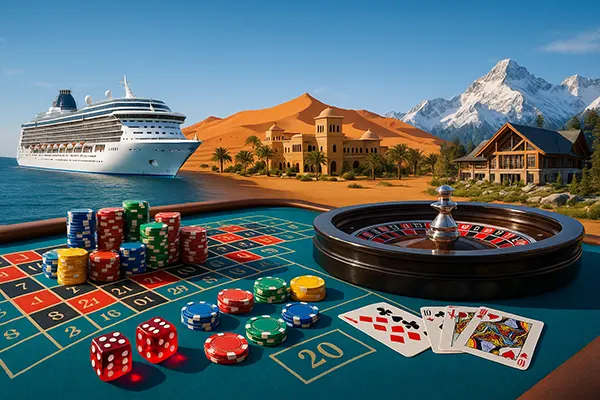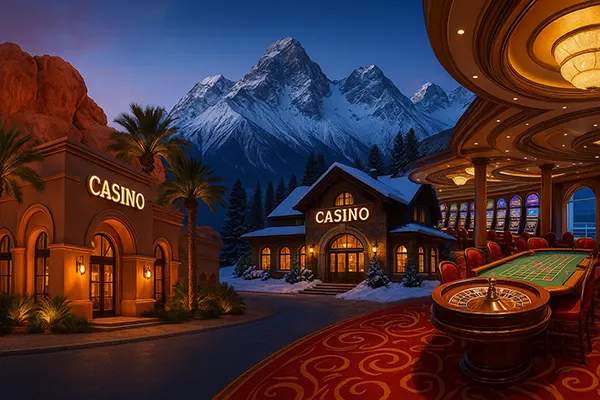
Gambling in Extreme Locations: Cruise Ships, Desert Resorts and Mountain Casinos
In recent years, the gambling industry has expanded beyond traditional land-based venues, bringing high-stakes entertainment to some of the most unexpected and challenging environments on Earth. From the luxurious decks of ocean-going cruise ships to glittering resorts in the middle of arid deserts and exclusive gaming halls perched high in mountain resorts, these locations offer unique experiences that combine the thrill of gambling with extraordinary surroundings. Each setting presents its own operational challenges, legal considerations, and distinct clientele, making them a fascinating subject for both industry insiders and players seeking a distinctive atmosphere.
Cruise Ship Casinos: Floating Entertainment Hubs
Casinos aboard cruise ships operate under complex regulations that often depend on the vessel’s flag state and international maritime law. Typically, gambling facilities only open once the ship is in international waters, allowing them to offer a wide range of slot machines, table games, and even poker tournaments. Operators must design these venues to withstand constant movement, comply with strict safety standards, and maintain operational efficiency despite space limitations. Onboard staff are often highly trained, providing a polished experience for passengers who may be gambling between fine dining and live shows.
The market for cruise ship gambling has grown in line with the rise of luxury cruises, with major cruise lines integrating world-class casino operations as part of their entertainment portfolio. This growth has been supported by advancements in technology, including sophisticated cashless payment systems and digital loyalty programs tailored for seafaring customers. With routes covering the Caribbean, Mediterranean, and Asian seas, these casinos cater to an international demographic, each bringing different gaming preferences and spending habits.
By 2025, environmental regulations have also influenced cruise ship casino design. Operators now integrate energy-efficient lighting, reduced-waste systems, and even renewable energy elements to align with broader sustainability initiatives in the maritime tourism sector. These changes are not only regulatory responses but also part of a broader marketing strategy to appeal to eco-conscious travellers who still seek high-end entertainment.
Challenges and Opportunities in Maritime Gambling
Running a casino at sea comes with unique logistical challenges. Supply chains must account for long voyages, requiring precise inventory planning for gaming chips, cards, and machine maintenance parts. Additionally, staff recruitment can be complex, as crew members need both gaming qualifications and maritime certifications. Security is another priority, with advanced surveillance systems installed to ensure fair play and protect against fraud in a confined environment where guests and crew interact daily.
On the opportunity side, cruise ship casinos benefit from a captive audience. With passengers on board for days or weeks, operators can offer themed gaming nights, high-roller events, and loyalty perks that encourage repeat visits. The exclusivity of gambling at sea also creates a premium appeal, with some ships offering private VIP gaming rooms and personalised dealer services. These factors make maritime casinos a lucrative, if demanding, sector of the gambling industry.
Finally, partnerships between cruise lines and major land-based casino brands are becoming more common, allowing for cross-promotional campaigns and seamless integration of loyalty points. This trend blurs the lines between land and sea gambling markets, offering players continuity in rewards and experiences across different environments.
Desert Casinos: Oases of Luxury and Entertainment
Casinos in desert locations, such as Las Vegas in the United States or emerging gaming hubs in the Middle East and North Africa, thrive on creating lavish oases amidst barren landscapes. These venues are not just gambling halls but full-scale resorts featuring luxury hotels, fine dining, concert arenas, and high-end shopping. The extreme climate shapes both architectural design and operational strategies, from advanced air conditioning systems to shaded pedestrian pathways connecting various entertainment complexes.
In 2025, technological innovation plays a significant role in desert casino operations. Smart energy systems powered by solar farms help offset the high electricity demands, while water conservation measures ensure sustainable operation in regions with scarce natural resources. These developments not only comply with environmental policies but also enhance the public image of desert gaming resorts, making them more appealing to environmentally conscious visitors.
The clientele for desert casinos is highly diverse, ranging from high-spending international tourists to local patrons seeking weekend entertainment. This diversity influences game selection, promotional offers, and cultural considerations in marketing strategies. For instance, some Middle Eastern casinos operate under strict guidelines to accommodate regional laws and customs, creating tailored gaming experiences that still meet international luxury standards.
Architectural and Cultural Factors in Desert Gaming
Building a casino in a desert environment requires specialised engineering to protect against intense heat, sandstorms, and significant temperature fluctuations between day and night. Materials must be durable and low-maintenance, while interiors are designed for comfort and to create an immersive escape from the harsh exterior environment. Lighting, soundproofing, and climate control systems are all optimised for guest comfort.
Cultural sensitivity also plays a central role in how desert casinos operate. In some regions, regulations restrict certain games or advertising approaches, requiring operators to adapt their offerings. Language services, culturally aligned hospitality, and cuisine diversity are also essential for attracting an international customer base while respecting local traditions. These factors contribute to the unique blend of global and regional characteristics in desert-based gambling resorts.
From an investment perspective, desert casinos often benefit from large-scale tourism infrastructure, including airports, convention centres, and luxury shopping districts. This integration with wider urban development ensures a steady flow of visitors and positions these casinos as central pillars of regional economic growth.

Mountain Resort Casinos: High-Altitude Gaming Destinations
Mountain resort casinos, found in regions such as the Swiss Alps, the Rockies, or Andean tourist areas, combine gambling with skiing, hiking, and spa tourism. These venues attract visitors seeking a mix of recreation and gaming in pristine natural settings. The seasonal nature of mountain tourism shapes casino operations, with peak activity in winter sports seasons and secondary peaks during summer hiking months. This cyclical demand influences staffing, marketing, and event planning.
Accessibility is a key factor, as many mountain casinos are located in remote areas reachable only by mountain roads or cable cars. This exclusivity enhances their appeal but also requires meticulous logistical planning for supplies, equipment, and staff transport. Operators often invest in robust infrastructure to ensure reliable power, heating, and internet connectivity in challenging weather conditions.
By 2025, sustainability has become a central focus for mountain casinos. Renewable energy sources such as hydropower and solar installations are widely adopted, while eco-friendly building materials and waste reduction programs minimise environmental impact. This aligns with the broader eco-tourism trend, attracting guests who prioritise responsible travel without compromising on luxury and entertainment.
Operational Considerations for High-Altitude Gambling
Staffing in high-altitude locations requires careful planning, as employees must adapt to thinner air and potentially harsh weather. Training programmes often include health and safety measures specific to mountain environments, ensuring both staff and guest well-being. Additionally, specialised maintenance teams are essential for keeping facilities operational in heavy snow or ice conditions.
Marketing strategies for mountain casinos frequently highlight the combination of outdoor adventure and indoor luxury. Package deals may include ski passes, spa treatments, and exclusive gaming events, providing guests with a well-rounded holiday experience. This integrated approach helps operators maximise occupancy and revenue across both gaming and hospitality services.
Finally, the community relationship is particularly important in mountain regions. Casinos often support local businesses, sponsor events, and invest in environmental conservation initiatives. This not only enhances their reputation but also strengthens ties with the surrounding community, which can be vital for long-term operational success in sensitive ecological areas.
